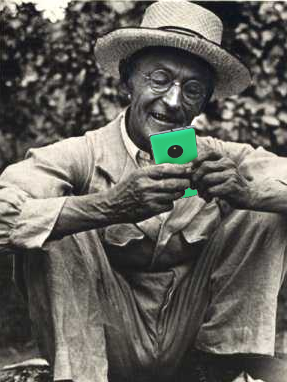
Hermann Hesse: a Social Media User?
Dieser Beitrag ist auch verfügbar auf:
![]() Deutsch (German)
Deutsch (German)
Later this year, Germany‘s Suhrkamp Verlag will publish a volume of Hermann Hesse‘s letters between 1947 and 1951 (see “Das Unerträgliche muß zu Wort kommen” at suhrkamp.de). In the years when letter writing was the primary form of long-distance communication, many writers developed enormous volumes of correspondence, and Hesse’s literary production of novels, stories, poems, reviews, and essays are augmented by his epistolary legacy.
What if Hesse were alive today, in an age where social media are a dominant form of human communication and exchange? Would Hesse mention on Facebook the book he had just finished? Would his Instagram feed feature photographs from his garden? Would he publish musings on politics or everyday life in his Twitter feed? Would he even post Snapchats of his sons or cat or breakfast?
Idle musings these are not. Writing for the public is, of course, an essential form of communication and its forms are determined by the era in which it takes place. Some of our oldest works of literature existed originally in spoken form and only acquired their text-based, permanent dimensions much later. Take, for example, the Epic of Gilgamesh, a legend dating back some four thousand years and narrated in five extant Sumerian poems. The legend evolved over time and likely influenced two epic Greek poems: Homer’s Iliad and Odyssey. The epic was rediscovered in the mid-nineteenth century, and upon being translated into many languages, was found to share many similarities with the Hebrew Bible. Since the middle of the twentieth century, it has become even more widely known around the world and became, for example, in 1991 the basis for an episode (“Darmok”) of Star Trek: The Next Generation.
One of the literary forms used by Hermann Hesse was the novel, which can be traced back at least as far as classical Rome. The novel form became especially popular in Europe following the invention of the printing press, and the modern European novel came into being by the eighteenth century. Hesse used this form throughout his literary career and wrote for both an audience and for himself. Demian, for example, originally published under a pseudonym was as much a response of Hesse to his psychoanalytic treatment as it was a minor sensation to its early readers.
Why is this important? It is just one example of many throughout Hesse’s life where he used a contemporaneous form of human communication to explore himself, life, and his relationships with other humans. And that brings us to the subject of our twenty-first century social media. Given that Hesse diligently read and responded to the many letters he received from people all over the world, it is perhaps not a conceit to imagine that, even within his cocoon in southern Switzerland, he would have been active in social media.
Perhaps a bigger question is: what would Hesse have said about social media’s outsize influence in so many aspects of our lives? An examination of Hesse’s career and responses to the many challenges in his life clearly shows that he was not one to rebel outright against the larger movements with which he may have disagreed, but rather, he sought to work within them for better outcomes. When World War I, for example, broke out, he worked to provide prisoners of war with books. When the Nazis took over Germany, he sought to avoid direct confrontations with the German authorities, so that his works that were still in circulation in Germany could still reach as many readers as possible.
Human communication has evolved throughout history with social, political, and technological changes, and writers have evolved with them. Thus, it is no conceit to imagine that the letter-writing Hermann Hesse of a century ago could well have become the Instagram enthusiast of today: chronicling his life, reacting to the world around him, and exchanging with his fellow human beings.
